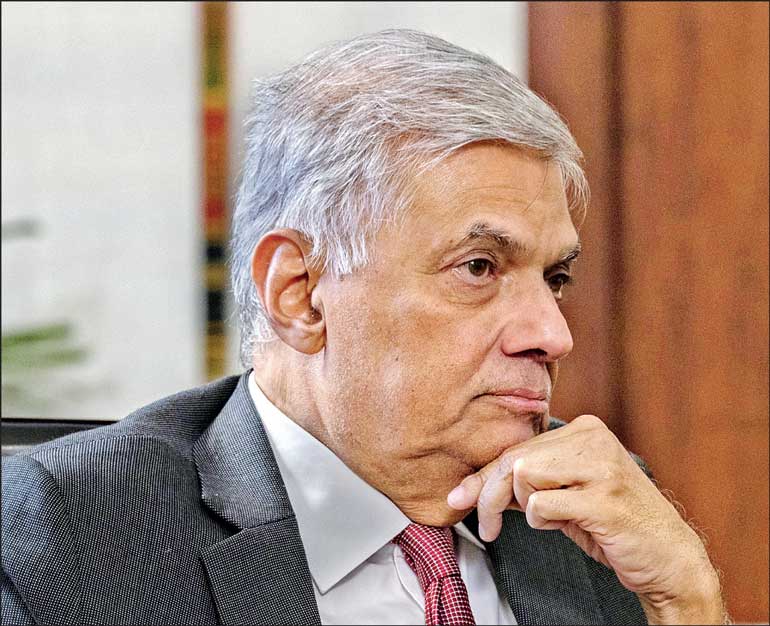Thursday Feb 19, 2026
Thursday Feb 19, 2026
Tuesday, 15 August 2023 00:12 - - {{hitsCtrl.values.hits}}

RW believes in a simplistic formula that the IMF magic and India inspired 13A would transform Sri Lanka into a first world nation by year 2048
The tragedy is that no political party except NPP is prepared to change the socio-political and cultural edifice or system on which the country’s governance is structured and economy operates. A corruption free and meritocratic government with a constitution based on secular democracy is an absolute need of the time. 2024 promises to be a year of election or elections. While RW may prefer to campaign on his economic credentials, his opponents, except NPP, would use 13A and its threat to Sinhala Buddhist supremacy as a trump card. At the end, the rotten system would continue unless it is thrown out by a popular uprising
 While the IMF directed economic recovery program remains only partially completed, President Ranil Wickremesinghe is switching attention to implement the controversial 13th Amendment. RW believes in a simplistic formula that the IMF magic and India inspired 13A would transform Sri Lanka into a first world nation by year 2048. Surprisingly, “target 2048” has now received endorsement as a viable objective from certain intellectual quarters also. However, a critical look at IMF economics and politics behind 13A would reveal that they point not towards a prosperous 2048 but a turbulent if not bloody 2024.
While the IMF directed economic recovery program remains only partially completed, President Ranil Wickremesinghe is switching attention to implement the controversial 13th Amendment. RW believes in a simplistic formula that the IMF magic and India inspired 13A would transform Sri Lanka into a first world nation by year 2048. Surprisingly, “target 2048” has now received endorsement as a viable objective from certain intellectual quarters also. However, a critical look at IMF economics and politics behind 13A would reveal that they point not towards a prosperous 2048 but a turbulent if not bloody 2024.
To start with, the IMF economics or its recovery plan and 13A are separate outcomes of the involvement of two hegemons, one global and the other regional, and both have their own individual agendas. Between the two is a local hegemon with a supremacist Buddhist face which may tolerate the recovery plan of IMF but not the India inspired 13A. RW’s powerlessness to confront the supremacists head on would spell disaster for any economic recovery and doom the prospects of “target 2048”.
The IMF recovery agenda as discussed by several contributors to this journal is not directly intended to make Sri Lanka economically independent and prosperous but indirectly to make it more and more dependent on the neo-liberal economic order under US hegemony. So long as Sri Lanka remains a member of the global family of open and liberal economies, thanks to JR, there is no alternative but to seek assistance from IMF whenever the economy runs into chronic balance of Payment deficits, budget deficits, unbearable debt burden and therefore financial bankruptcy as happened in 2022. But while the Rajapaksas were dilly dallying to approach the only saviour, RW was forthright and went at once no sooner he became President. What did he receive in return?
As expected, IMF’s main concern was to stabilise the country’s financial sector and see that the economy revives to an extent that it would enable its managers to honour the obligations to foreign creditors. As pointed out earlier, it is not the economic independence of member nations, but their continued dependence on wealthier capitalist members led by US that is the primary objective of IMF and its sister organisation World Bank. It is no secret that IMF is not only the watchdog of financial capitalism but also its unofficial debt collector.
It was as debt collector that IMF insisted that the RW regime should first come to terms with foreign creditors to restructure the debt before receiving financial assistance from the organisation. Sri Lanka obliged and the first tranche of the $ 2.9 billion EFF was released along with a comprehensive policy package to be implemented. The fiscal side of that package has been attended to but at a terrible cost to ordinary householders. Yet, debt restructuring arrangements are yet to be undertaken. Until that is completed and the rest of IMF’s agenda implemented it would be premature to celebrate the little benefits achieved so far from the recovery program. In short, what is yet to be accomplished is far more challenging than has been implemented.
The 13th Amendment like the IMF program is also foreign inspired and it was a legislation passed under duress. However, after it was legislated by the parliament in 1987 it virtually remained a dead letter for 43 years until 2020 when former president Gotabaya Rajapaksa (GR) made a desperate visit to Delhi to beg for financial assistance from Modi’s India. Although GR was an ardent Buddhist supremacist and was elected to power overwhelmingly by Buddhists, he promised Modi, perhaps with a feeling of disgust, that he would implement 13A. What happened afterwards is history.
Three years after that episode his successor RW to avoid repetition of GR’s experience decided on the eve of his visit to Delhi to open negotiations with relevant parties on the possibility of implementing 13A. This was a shrewd move intended to satisfy India and it was successful. India’s largesse was opened more generously this time and apart from the promise of more economic and financial assistance, Modi also promised to “strengthen the maritime, air, energy and people-to-people connectivity”. That connectivity also meant construction of a land bridge across the Palk Strait.
To India, that connectivity is part of a long-term strategy to “keep the Indian Ocean … remain fully Indian” (K. M. Panikkar, India and the Indian Ocean, 1945: p, 84). For decades, India operated its foreign policy under the assumption that any threat to its security came always from the north and not from south. That assumption was shattered when China started penetrating into India’s ocean with the One Belt One Road project. When Sri Lanka leased its Hambantota Harbour to that rival for 99 years it sent shock waves to Delhi. That is why the Modi Government is all out to bring the island back into its foreign policy net.
The economic crisis and financial bankruptcy of the country was a godsend to India.
Ironically, it was under Prime Minister RW in 2017 that the lease over Hambantota Harbour was signed, and in 2023 the same RW as President had endorsed India’s extensive penetration into his country and make it India’s junior partner. Is this a balancing act? How would China react when RW meets President Xi Jinping next?
To the local hegemon in the meantime, 13A and India’s connectivity agenda would rekindle old fears of Indian invasions and Tamil power. The supremacists view that the demand by Tamil leaders for full implementation of 13A along the lines of federalism tantamount to a division of the country. Cast conscious Mahanayakkas and their saffron foot soldiers have already started a scare campaign against India and 13A. That ethnic reconciliation would bring in more investment to the country from diaspora Tamils and that the economy would benefit as a result seem to be of no value to the supremacists. President RW with all executive powers vested upon his office feels incompetent or impotent to cut down the power and influence of political monks. Because, the existing political system is a virtual theocracy and no political leader could afford to antagonise the hierocracy and hope to remain in power.
In this context, it may not be out of place to recall a story circulating in Colombo during the tragic days of SWRD’s assassination at the hands of a Buddhist monk. According to that story, former Prime Minister John Kotelawala (JK), when visited SWRD in the hospital had told him that it was JK who tied the dogs to the gate and that SWRD let them loose and ended up bitten by them. How true this story is not certain, but to those who have some idea about the outspoken character of JK the story sounds credible. Unless all religions are privatised and depoliticised there is no hope for building a united Sri Lanka. Thus, the politics of 13A and economics of IMF do not augur well for RW to realise his 2048 target.
The tragedy is that no political party except NPP is prepared to change the socio-political and cultural edifice or system on which the country’s governance is structured and economy operates. A corruption free and meritocratic government with a constitution based on secular democracy is an absolute need of the time. 2024 promises to be a year of election or elections. While RW may prefer to campaign on his economic credentials, his opponents, except NPP, would use 13A and its threat to Sinhala Buddhist supremacy as a trump card. At the end, the rotten system would continue unless it is thrown out by a popular uprising.
(The writer is attached to Murdoch Business School, Murdoch University, Western Australia.)